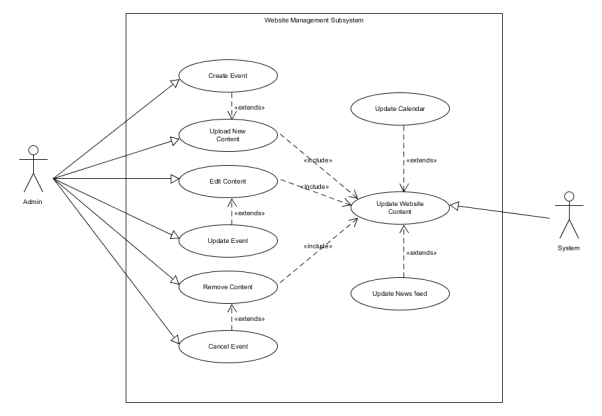System Analysis Report
Table of Contents
The purpose of this report is to present the proposed system analysis for the client, Click & Connect, with the intention of ensuring all stakeholders involved agree on the planned solution. Throughout the project the analysis, development, implementation and testing phases will be conducted using, the industry standard, agile development life cycle. This specifies that changes can be made if required and appropriate. The system analysis report is intended for all the project’s major stakeholders: the client, the academic supervisors and the development team.
Firstly, this report will highlight the system vision by expanding on the project description, system capabilities and business benefits. The purpose of this initial section is to ensure that all stakeholders involved agree on the expectations and benefits of the system.
Secondly, in this deliverable the system requirements section is used to describe the functionality listed in the system vision and with the use of diagrams allow for all stakeholders to agree on the system requirements. With the use of a functional decomposition diagram the major subsystem for the Click & Connect system have been described and all major functions identified. Alongside this a conceptual data model (entity relationship diagram) is presented to assist in explaining the main business processes and their relationships. It is expected that this diagram will change throughout the iterative development process. Following on, an architecture overview is utilised to highlight the current IT system and any proposed constraints. Finally, in the system requirements section a prioritised list of the system build plans has been included. The purpose of this section is to identify and describe the system requirements and constraints on the system.
Thirdly, the project organisation section of this report focuses on the system development approach, the team structure, the overall project plan and risk management plan. Ultimately this section will describe how the system develop will be approached with both its iterative and incremental nature in each build. A Gantt chart has been included to list the major tasks that will be carried out and the proposed timetable that will be followed. This chart, as a part of the overall project plan, includes the tasks and activities highlighted in the system overview. Alongside this, the risk management plan outlines current risks and possible impact they would have on the project completion. The intention of this section is to ensure all stakeholders are across the incremental development and risks involved with this project.
Finally, in this document a sign off sheet has been provided to ensure that the client has acknowledge the system overview report and to signal acceptance of the scope, content and expectations laid within. In this section if aspects are to be changed they need to be noted and agreed upon. As well an appendix has been included with client interactions and development artefacts.
Project Description
Client Background
Click & Connect – English for kids Inc. is not for profit organisation that use technology to connect with disadvantaged students from underprivileged backgrounds. Using skype, volunteers connect with their students to achieve both academic success and self-empowerment for their students. Their focus is on enriching the lives of those less fortunate by teaching English and other skills. Click & Connect skype lessons are currently taught out of King David School, in Armadale, where volunteers teach English to students from elementary schools in Israel. They are currently connected with two schools however aspire to educate students from across the globe, when the organisation grows. The program has been acknowledge and welcomed by the Israeli Ministry of Education.
History Leading up to the Project
Click & Connect’s current website was created by volunteer programmer who designed a basic website. The website’s current functions allow for visitors to access information about the organisation and how to contact them. The website also allows for individuals to apply to be a volunteer, which is done by filling out an online form, attaching a police check and a working with childrens check. Alongside this the website has an image carousel which displays images highlighting the students and volunteers learning together. The current website has an upcoming events section, where the client can create, read, update and delete.
System Modifications – Including System needs and Current Problems
The current system is simple and does not provide all necessary functionality that the organisation requires. The clients aspires for the organisation to expand over the next few years and they have acknowledges that a more complex system is required. The dream for client is to have the organisation expand regardless of geographic location and ultimately enable volunteers to teach students from around the world.
Firstly, the client has requested that the website to be aesthetically enticing to encourage visitor to either volunteer as a teacher or donate to the organisation.
Secondly, the website has a video carousel (vimeo) which the client is not entirely happy with. The client is happy to keep the image carousel however they would like it to be presented better and to include more images of education and the students learning.
Thirdly, and arguably the most important aspect, the client would like a secure password protected portal for volunteers to log into and access all the information required. The client would like the volunteers to be able to access lesson information prior to starting the skype lessons.
Additionally, as mentioned before, all skye lessons calls are currently made from the King David School in Armadale where volunteers log into skype. The client is requesting if there is a way for volunteers to make their skype lesson calls from home (or any geographic location) via the volunteer portal. With this new feature it will be fundamental that the calls can be monitored so the organisation is aware who is calling the students. This aspect will allow for the organisation to grow and allow for volunteers from around the world to teach the students.
Next, the client wants to modify their system to include an internal calendar. This calendar will be used to advise dates of important events and post classes per semester. Additionally, the client currently accepts donations by cheque and responds by writing a handwritten thank you letter to the donor. The client has requested that the revamped website has an aspect for visitors to the website to donate to the organisation. The donation of the aspect will ultimately increase the number of donations received due to the usability and efficiency of online donations.
System Capabilities
Stakeholders
- Volunteers: those volunteering time to teach students via skype
- Admin: those individual/s which manage the system
- Donors: those individuals who donate to the organisation
- Teachers: external to the organisation, the teachers managing students receiving lessons
- Students: external to the organisation, those being taught via skype
Activities of Stakeholders
- Volunteers
- Make skype calls
- Check lesson plans
- View internal calendar
- Admin
- Create, read, update, delete content
- Monitor lessons
- Update lesson plans
- Create calendar events
- Donors:
- Donate funds
- Receive donation invoice
Context
- Physical locations the system will be used: Volunteers houses, volunteers schools, currently main administrator client main location is the King David School in Armadale
Technology
- Internet Service Provider
- Skype
- Computers/Laptops
- Website/Browser Based: html, xml, css
- CakePHP, CodeAnywhere, jQuery
- Database design, mySQL, phpMyAdmin
- Vimeo
Non-Functional Requirements
- Security: a secure portal login will ensure security for all stakeholders
- Reliability: ensuring that software & hardware will perform the required tasks
- Usability: the modified website interface and the internal database system designed to be user friendly and straightforward
- Extensibility: the client has stated that the organisation will one day be handed over therefore the system will be built in a way that future growth can occur
- Documentation: user manuals to ensure that the system can be maintained once the Industry experience project has commenced
Business Benefits
The following business benefits have be derived from the proposed system vision, system capabilities and all meetings held with Click & Connect. For the purpose of this report all benefits and have been categorized by who the primary benefiter would be, the action that would be taken and of course the outcome this benefit would have.
Volunteers
-
Action: Skype lesson calls made via secure portal
- Primary benefit: Enables calls to be made regardless of geographic location
- Outcome: Increasing the number of volunteers as the calls can be made securely from around the globe
-
Action: Internal Calendar
- Primary benefit: Keep volunteers up to date with semester information and important dates
- Outcome: Ensure all volunteers are aware of up to date information thus increasing efficiency
Donors
-
Action: Donations made online via PayPal
- Primary benefit: donors can easily donate funds to the organisation online
- Outcome: Potential increase in amount of donations the organisation will receive – as a not for profit organisation these donations are crucial
Admin
-
Action: Creating a secure password protected portal
- Primary benefit: Ensuring that only authorised users (volunteers or approved users) can access sensitive information regarding lesson plans, times and students
- Outcome: Security for volunteers and students is one of the main priorities for Click & Connect. This secure portal will ensure all data and information is safe
-
Action: Monitoring Skype calls
- Primary benefit: Ensuring security
- Outcome: the admin (client) will be able access information about when skype calls were made to students
Organisation
-
Action: Editing the content and design of the current website
- Primary benefit: An aesthetically enticing website hypothetically will encourage visitors to the website to be drawn and in and more likely to donate and/or volunteer to the organisation
- Outcome: Increase in volunteers and donations
-
Action: Improving on current video carousel (vimeo)
- Primary benefit: Showcasing images of students and teachers learning will put a face to the organisation and encourage those visiting the website to donate and/or volunteer to the organisation
- Outcome: Increase in volunteers and donations
Â
Major Sub-systems (Functional Decomposition Diagram)
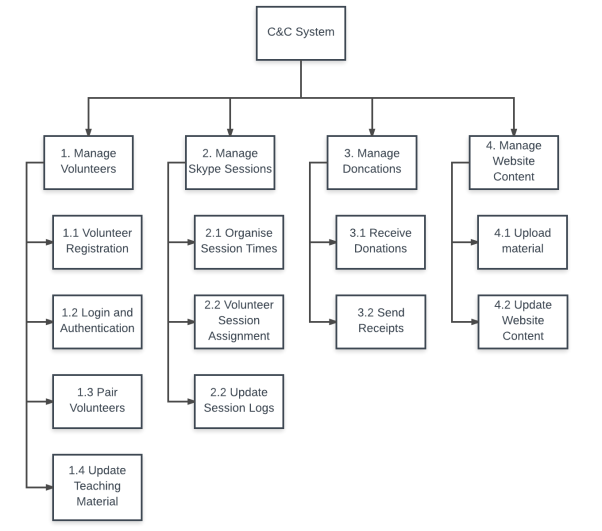
Figure 1. Functional Decomposition Diagram of Click and Connect’s System.Remove 1.3
This diagram encompasses different pieces of functionality that the complete system should provide. Each function or subsystem is broken down further into smaller processes.
Â
Functional Decomposition Diagram Description
The following is a description of each major function or subsystem from Figure 1.
1. Manage Volunteers
1.1 Volunteer Registration
Only members of the organisation such as volunteers are allowed to access certain resources. First, potential volunteers are required to input personal information and take a quick survey. Documents and certificates showing proof of working with children are required to become a volunteer.
Volunteers are also given a skype account belonging to Click and Connect.
1.2 Login and Authentication
Important step in safeguarding the website from ‘attackers.’ Only volunteers and personnel with administrative rights have a login and username. All other information on the website is public, hence no security restrictions are needed on other pages of the website.
Genuine users will be able to access Click and Connect’s volunteer page or admin page. This is very much dependent on their access rights which is assigned upon account creation.
1.3 Update Teaching Material
This an admin function where teaching material can be uploaded and managed. This is a necessary function to ensure that the children are taught a variety of topics and not the same topics by different volunteers.
2. Manage skype sessions
Unfortunately, no real solution has been adopted as of yet. (Many holes in understanding of this subsystem)
2.1 Organise Session Times
Schools must let the organisation know what days and times during the week they are providing this program for the children. Similarly, volunteers are required to set days and times they are available to participate in skype sessions.
2.2 Volunteer Session Assignment
What happens is that the school asks for a certain number of volunteers. (E.g. 5 teams in a classroom means that they will need 5 volunteers for the next hour). Volunteers who are available at the time will be invited to join the skype sessions by clicking on a link or button.
2.3 Update Session Logs
Certain information is kept about each skype session between volunteers and the children. This is for security concerns and allows easy tracking of accounts to follow up on flagged behaviour.
3. Manage Donations
Visitors are able to make donations by accessing the donation page on the website. PayPal’s online service will be integrated into Click and Connect’s website to handle donations. PayPal is a widely accepted brand that takes most credit cards including Visa, MasterCard and American Express. It is also free and does not take any commission.
3.1 Receive Donations
The donor is required to submit personal information and payment details in order for donation to be successful.
3.2 Send Emails (Receipt or other)
Sending of receipts is going to be an automated process. A receipt will be sent to a donor immediately after their donation has been processed.
4. Manage Website Content
Solely an admin function where they can change the content of the website such as images and text.
4.1 Upload Material
The admin can make changes to specific elements of the homepage and other pages of the website. An easy to use interface allows uploading of images and texts. It is also possible to specific elements that needs to be changed. Some of these elements include:
- Images in the Carousel
- Resource Page
- History Page
- Event creation and updates fall under this category as they are just specific places where new content is applied. This will change the homepage under ‘Upcoming Events.’
4.2 Update Website Content
Once the material has been uploaded, they will be applied where appropriate. The admin has the option to prevent certain content to be changed and can also remove content. (E.g. Admin adds a new video to the website, however, this video does not replace or appear on the front page unless specified.)
Constraints
- Volunteers have a limited number of sessions that they can take each week and month.
- This constraint is in place so that other volunteers may also get an opportunity to participate – especially since the accounts are shared.
- Volunteers can only have a single account. (1 username and an associated password)
- Volunteers are assigned 1 skype account.
- Admin is only able to change the content and not the layout of the website.
- Not every aspect or page is changeable.
See Appendix for development artefacts
Â
Conceptual Data Model
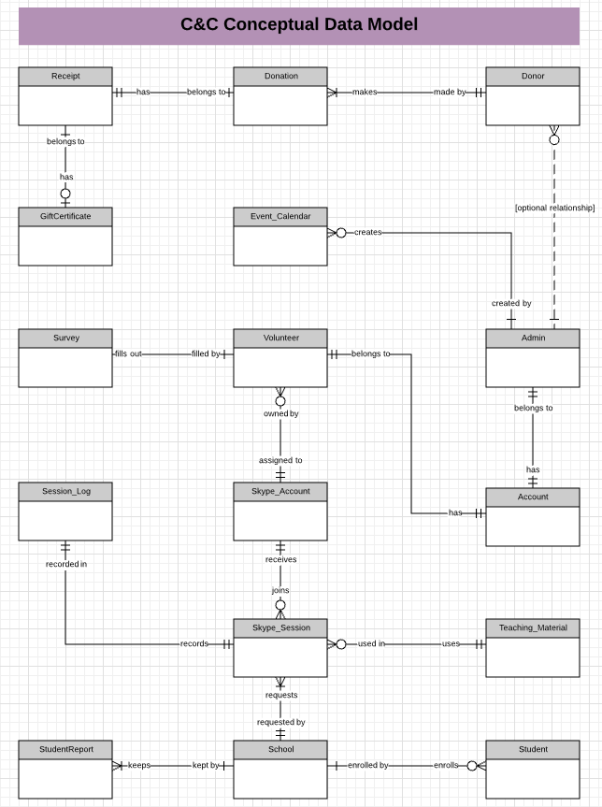
Description
Our client, Click & Connect (C&C) manages its database system by storing the information in a number of entities such as:
- Staff/Admin – managing tutors’ schedule session and receive donation from donors
- Donor – there are mainly two type of donors. Donation can be cash or material such as book
- Tutor – is connected to school and course
- Country – storing the country names. At the moment, C&C’s tutors are in Australia and there are prospective tutors from New York and Canada
- Tutor_School – is the bridge to connect between tutor and school entities
- School – consist of tutor, class/session and students’ names
- Class/Session – displays all the available sessions for the school
- Student – stores the required details about the students
- Course – lists different levels of course and its related tutor
To display more details, please see Entity Relationship Diagram below
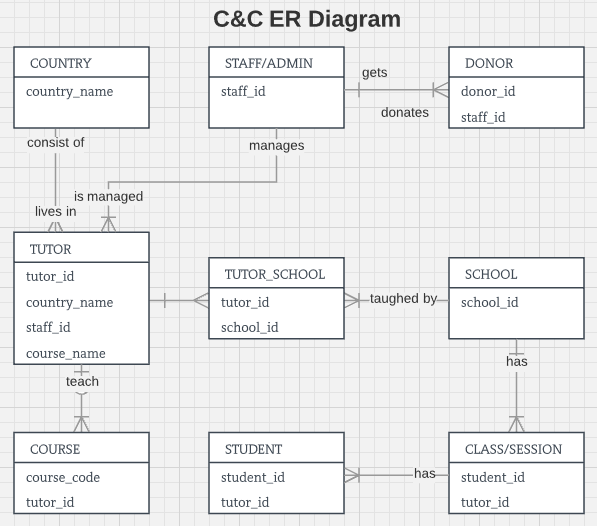
Proposed System Architecture Overview
The client wish to have a flash screen as a starting point. It displays rich of features as much as possible to attract all visitors with ease of use and navigation.
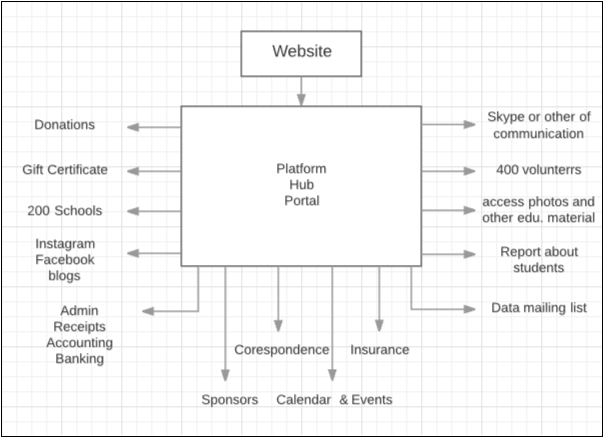
The above image is the initial system architecture overview of our client. Also, it is the only paper base information which we received from C&C. this becomes an appendix to the erd
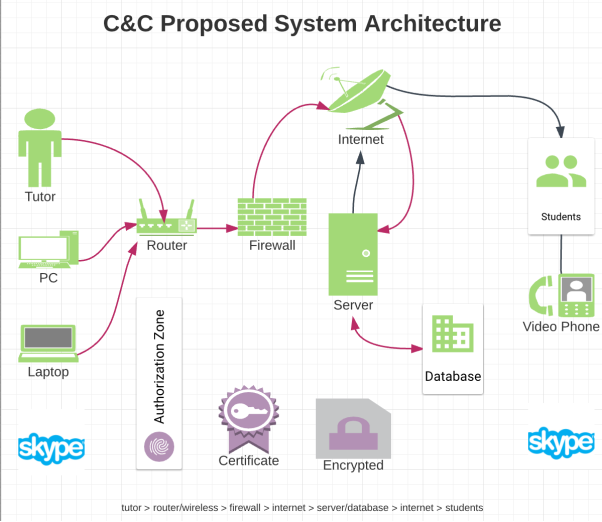
– The one in the presentation become an appendix
Â
Build Plan
In each cycle, we will work on a single function or sub-system from Figure 1.
Priority:
- Volunteer Management Function
- Skype Session Management Function
- Donations Management
- Website Content Management
See Project Organisation on the next page for more details.
Â
System Development Approach
The proposed system development for Click and Connect will be created using an Agile development approach. Agile development methodology provides opportunities to assess the direction of a project throughout the development lifecycle. This is achieved through regular cadences of work, known as sprints or iterations, at the end of which teams must present a potentially shippable product increment. By focusing on the repetition of abbreviated work cycles as well as the functional product they yield, agile methodology is described as “iterative” and “incremental.” In waterfall, development teams only have one chance to get each aspect of a project right. In an agile paradigm, every aspect of development – requirements, design, etc. – is continually revisited throughout the lifecycle. Every time we finish a cycle, we stop and test with our client and then get feedback so we can make changes if needed. Otherwise the project won’t go towards the right direction. Our project is to develop sub-systems based on the website they have at the moment. Functions are prioritised like:
       1.Volunteer Management Function
       2.Skype Session Management Function
       3.Donations Management
       4.Website Content Management
Team Structure
Team Name: Slash Programming
Team Number: 8
Team Members: Anthony Nguyen (Project manager)
                          Lauren Madson (Client Liaison)
                          Sinon Sil
                          Hanyu Li
As a team, we will all contribute to the project and attend meetings as long as we are able to. Everybody’s ideas will be considered and discussed so that we can make a better decision. Each member will have a specific role in the build plan and will all help to work on each cycle.
Overall Project Plan
Gantt Chart
This gantt chart is created from Microsoft Project software. The tasks in this gantt chart are from the initial project plan. We may make changes to the project according to the further information given by our client. Currently we just finished the system overview report. And we will start to build the functions that our client requires. Although we only have 4 main functions to implement, but the subsystems in each function could take some time to build.
We will try finish all function before build 5 then we can do system testing and fix small problem we may face.
Risk Management Plan
Risk Name:
Risk Description: Context (What is it? Likelihood of occurring and impact. Low/Medium/High)
Risk Management: (prevent, reduce, transfer, contingency, accept) What actions are needed implement the strategy?
Risk Name: Poor Time Management Skills (Team Risk) May conflict with incorrect time estimates & scheduling
Risk Description: Tasks may be allocated poorly. There is a high chance of this happening as many members of Slash Programming work several times a week as well as studying other units. This affects the ability to complete tasks on time and may result of failing to complete development deadlines.
Risk Management: (Transfer) –
Risk Name: Existing Architecture May Conflict with New Design
Risk Description: Click and Connect’s website is being worked on by another
Risk Management:
Risk Name:
Risk Description:
Risk Management:
Hanyu
Risk Name: Budget problem(budget risk)
Risk Description: during the development of the system, we may have to expenses, but this organization is non-profit, so it is hard for them to get budget from outside.
Risk Management: Apply for help from government
Risk Name: Third person involvement (team risk)
Risk Description: We heard there is a volunteer called Luke is also working on the website, we may have conflicts in the future.
Risk Management: keep each other informed and discuss the possible solutions
Lauren’s section
Risk Name: Third party components and plugins (technical risk)
Risk Description:
Risk Management:
Risk Name: Incorrect time estimates & scheduling (schedule risks)
Risk Description:
Risk Management:
Â
Project Title: Click and Connect Website
Start Date: 30/03/2017
Completion Date: 11/10/2017
Project Duration: 6 months and 12 days.
Signature……………………………………………………..Date……./……./……….
Client
Signature……………………………………………………..Date……./……./……….
Project Leader
Signature……………………………………………………..Date……./……./……….
Client Liaison
Signature……………………………………………………..Date……./……./……….
Project Builder
Signature……………………………………………………..Date……./……./……….
Project Builder
Â
|
Date |
Team Member |
Version |
|
19/03/17 |
1.00 |
|
|
20/03/17 |
1.01 |
|
|
20/03/17 |
1.02 |
|
|
21/03/17 |
1.03 |
|
|
21/03/17 |
1.04 |
|
|
22/03/17 |
1.05 |
|
|
24/03/17 |
2.00 |
|
|
24/03/17 |
2.01 |
|
|
24/03/17 |
2.02 |
|
|
25/03/17 |
2.03 |
|
|
25/03/17 |
2.04 |
|
|
25/03/17 |
2.05 |
|
|
26/03/17 |
2.06 |
|
|
26/03/17 |
2.07 |
|
|
27/03/17 |
2.08 |
|
|
28/03/17 |
3.00 |
Â
Client Interaction
Meeting minutes
Client interaction notes
Client weekly updates
Development Artefacts
User stories
The following stories were used to build use case diagrams in the next section.
Use Case Diagrams
Use case diagrams were used to help build an understanding of functional requirements in Figure 1.
Donation Subsystem
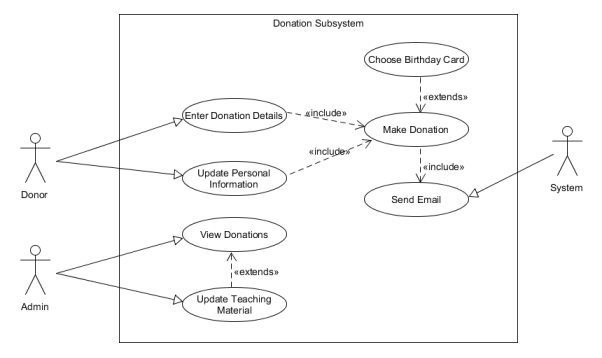
Skype Session Management Subsystem
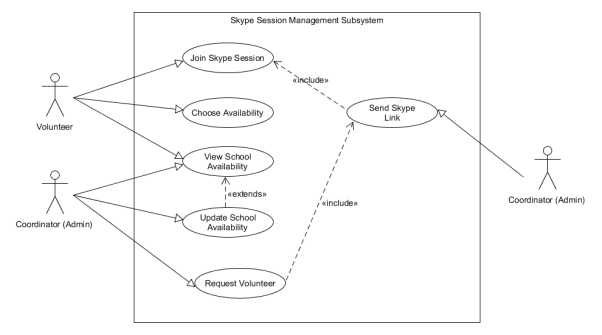
Volunteer Management Subsystem
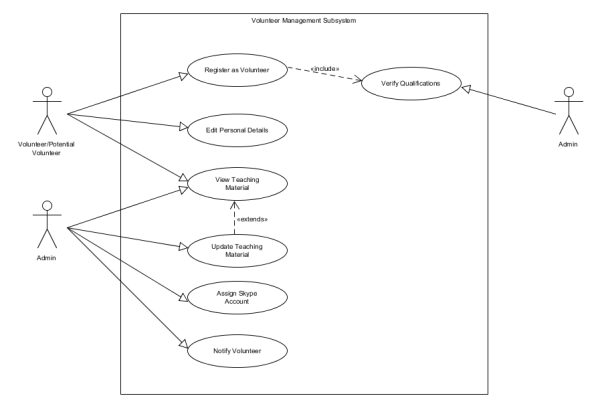
Website Management Subsystem
